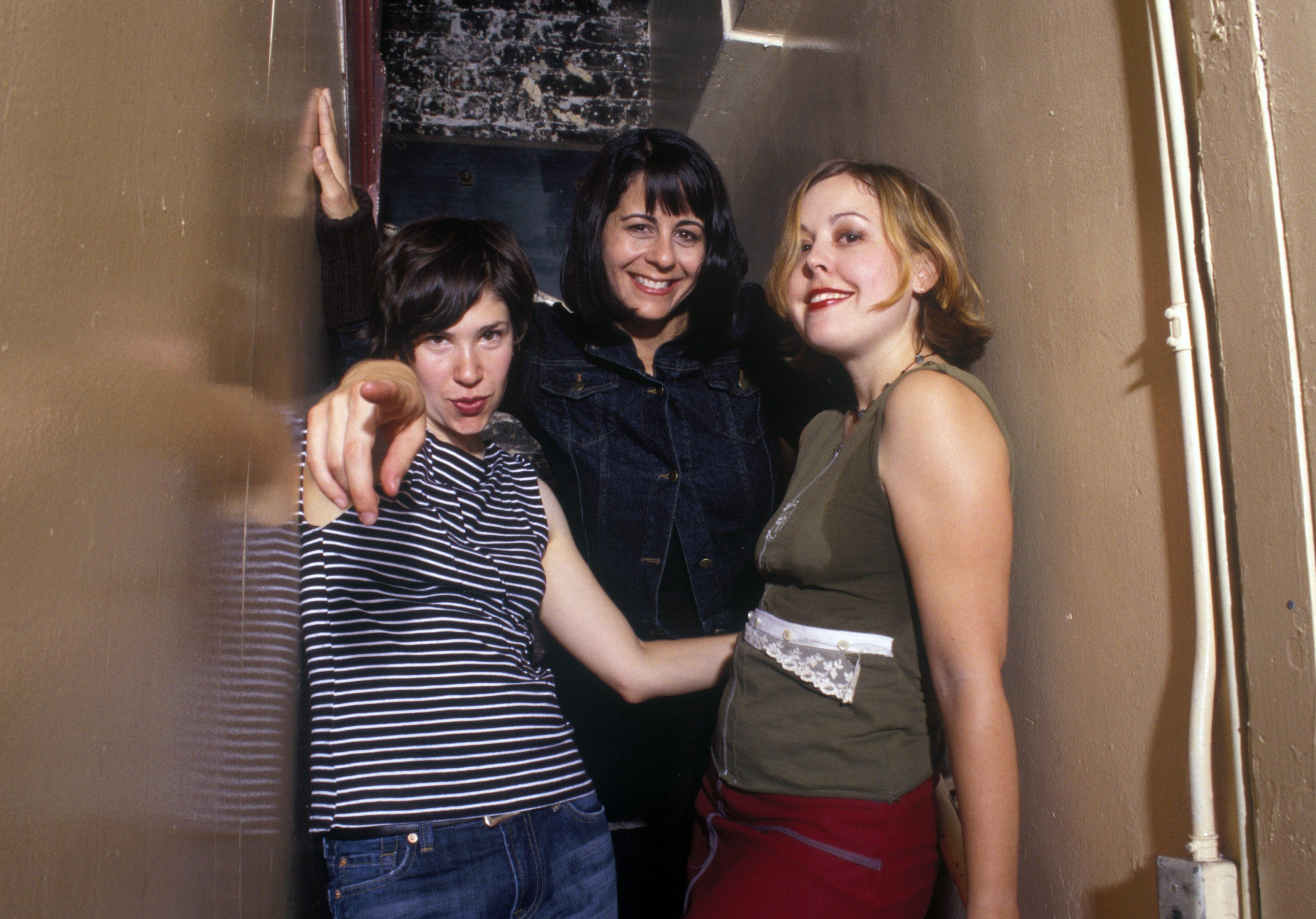Sleater-Kinney on how tragedy and loss affected their new album: ‘It tears at the scaffolding of one’s life’
Carrie Brownstein and Corin Tucker talk to Helen Brown about the writing of ‘Little Rope’, their lasting friendship, ranting about the internet, and the phone call that changed everything


Your support helps us to tell the story
From reproductive rights to climate change to Big Tech, The Independent is on the ground when the story is developing. Whether it's investigating the financials of Elon Musk's pro-Trump PAC or producing our latest documentary, 'The A Word', which shines a light on the American women fighting for reproductive rights, we know how important it is to parse out the facts from the messaging.
At such a critical moment in US history, we need reporters on the ground. Your donation allows us to keep sending journalists to speak to both sides of the story.
The Independent is trusted by Americans across the entire political spectrum. And unlike many other quality news outlets, we choose not to lock Americans out of our reporting and analysis with paywalls. We believe quality journalism should be available to everyone, paid for by those who can afford it.
Your support makes all the difference.Sleater-Kinney slide into view. Thirty years after they first formed in the scuffle of the Nineties grunge scene in Olympia, Washington, the OG Riot Grrrls – recently hailed by Rolling Stone as “the best American punk band ever” – are at the other end of a video call from the US. Decades of intelligent rage have been pressed into the grooves of their 10 previous studio albums. We’re here to talk about the 11th, Little Rope. It’s intense.
The band’s 51-year-old singer, Corin Tucker, is warm and relaxed in a grey hoodie; guitarist Carrie Brownstein – also the star and writer of the TV comedy Portlandia – is more restless, dressed in crisp, black lace. She leaves the call briefly to fetch herself a coffee. The press release for the album reveals that Brownstein’s mother and stepfather were killed in a car accident in Italy in the autumn of 2022. The American embassy staff were unable to contact her because she had changed her phone number. Tucker was listed as her emergency contact on a passport form, and so they called her, leaving her to give the awful news to her bandmate.
“It was so sad and shocking,” Tucker tells me. “We had started writing [Little Rope] before that happened. We had recorded four songs. But then the rest of the experience was so changed by tragedy and loss. It changed the emotional colour of the record. It made it so much more intense.”
“Yeah,” nods Brownstein, settling back down with her mug. “It was such a disorienting and nebulous time. It just really deconstructs everything. It tears at the scaffolding of one’s life. I really turned to music because I know that architecture. I knew the forms, the routines and the rituals of the craft of songwriting.”
On the record, they sound furious, frustrated; Brownstein’s guitar playing is charged and bittersweet. Music has always given the 49-year-old an escape from painful reality. “My constant, my salvation,” she called it in her 2016 memoir, Hunger Makes Me a Modern Girl. It’s an un-self-pitying tale of a smart, edgy girl who grew up feeling “unclaimed” by her superficially successful parents.
Her corporate lawyer dad, Kenny, was a closeted gay man. Her mother, Linda, was an anorexic who slowly checked out of suburban family life. Of her relationship with Linda Brownstein, Carrie writes: “We vacillated between shouting and silence, the megaphone and the mute.”
Disconnected from her parents, Brownstein engaged with music at a physical level, bashing against her peers in the mosh pits to feel real. She says: “I needed to press myself up against small stages... just so I could get a glimpse of who I wanted to be.”
You can still hear this tense butting-up against bottled emotion in the guitar style she once modelled on John Frusciante of the Red Hot Chili Peppers – although she would go on to make much cooler, weirder sounds than the sock-penised Los Angeles pogo-er. The sound she learned to make with Sleater-Kinney – named after a road off the interstate highway outside Olympia – was all awkward elbows and twisted tunings and discordant riffs. Like an indie rock answer to Joni Mitchell’s uncompromising female soundscapes.
“I’ve always loved making up weird chords, taking something sweet and sliding it sour,” Brownstein tells me today. Tucker nods. “The guitar mimics the human voice in a way that many instruments don’t. I love taking a ‘correct’ note and bending it into something that veers into weirdness, ugliness, dissonance. To me, that’s how the human heart works. It’s how our emotions feel – that you can be in one state, and then trip towards an opposite state.”
Enjoy unlimited access to 100 million ad-free songs and podcasts with Amazon Music
Sign up now for a 4 month free trial (3 months for non-Prime members)
Enjoy unlimited access to 100 million ad-free songs and podcasts with Amazon Music
Sign up now for a 4 month free trial (3 months for non-Prime members)
Tucker was raised by a single father – a folk musician in her case. She started out in a two-woman band, Heavens to Betsy, which inspired Brownstein to learn guitar. The pair dated briefly in the early 1990s, then decided to form a band and started auditioning drummers (they’ve had a few, including Janet Weiss, over the years). Although they broke up as a couple shortly after their debut album, Call the Doctor, topped a Village Voice critics’ poll, they’ve remained close friends.

“I don’t think we often realise it,” Brownstein tells me today, “But we are such constants in each other’s lives, and have been for three decades now. We don’t just step on stage as professional collaborators and PERFORM friendship for people.” She makes a face at the idea of fakery. “We live inside of a very active, ongoing friendship. That Corin is still the emergency contact on my passport was such a stark reminder of what a consistent person she is to me. Hers is one of five phone numbers that I know by heart. She’s just a very stable person.”
I’ve always loved making up weird chords, taking something sweet and sliding it sour
Tucker nods. “I definitely value that more as I get older. We’ve been looking back at photos together, and I was reminded that when my son was born, 22 years ago, I was having a really hard time. He was born premature, and I was really overwhelmed. I probably had postpartum depression, but that wasn’t really talked about that much back then.” She sighs. “My identity felt so shattered by being a mom. But Carrie came over to my house every day, to sit in my really grungy basement. She just said, ‘Let’s write music.’ I couldn’t even fathom it. That’s how we wrote One Beat. I can’t even tell you how important that was to me, to helping restore my sense of identity.”
One Beat (2002) was the band’s fifth album. It played out like a flamethrower against George W Bush’s presidency, post 9/11. While the title song groped for scientific certainty in a world of chaos, the track “Far Away” made the geopolitical personal, as Tucker described nursing her baby on the couch while watching the Twin Towers tumble on her TV: “... the heart is hit/ In a city far away/ But it feels so close ... I look to the sky/ And ask it not to rain/ On my family tonight.”
The tension continued to prickle through both women. In 2006, an anxiety-plagued Brownstein developed shingles. As Weiss hadn’t had chickenpox as a child, Brownstein isolated from the rest of the band, causing her mental health to decline until she suffered a breakdown in front of Tucker and Weiss. An exhausted Tucker wanted to spend more time with her family, and the band went on hiatus, its members engaging in different projects before reuniting in 2014. Their 2015 album – No More Cities to Love – was hailed by The Guardian as “pretty much the most perfect comeback of recent years”.

Unlike other bands, some of whom have reunited for cash and encores, Sleater-Kinney returned to the stage in an effort to shred their celebrity. “It seems to me the only thing/ That comes from fame is mediocrity,” snarled Tucker on “Hey, Darling”.
Today, Tucker tells me she suspects that the reason they’ve maintained their edge and energy is that “we don’t look back and bask in nostalgia, and we don’t ever telescope too much into the future, either. I had a back-up plan for at least the first decade of Sleater-Kinney. I thought, ‘Eventually I’ll go to graduate school and get a real job!’” She laughs. “Even now, we’re not planning further ahead than next year. But that’s part of the process for us, forcing ourselves to reckon with the present.”
In discussing the ways in which they nurture the dynamic of the band, neither Brownstein nor Tucker mentions ex-drummer Weiss, who left the band following the release of The Centre Won’t Hold, produced by Brownstein’s ex-girlfriend Annie Clark (aka St Vincent). That album saw the pair maintaining the right of older women to remain visible and keep making a big, dirty noise. On “LOVE” they proclaimed: “There’s nothing more frightening and nothing more obscene/ Than a well-worn body demanding to be seen.”

Although Little Rope was made in the shadow of both Weiss’s departure and Brownstein’s bereavement, the duo stress that it’s not a sombre record. In fact, Brownstein says those reminders of life’s impermanence “brought into focus a deeper caretaking of the songs... it was almost like they had become these bodies we had to tend, to make sure they were complete and in the shapes we wanted them to be in.”
And there’s no let-up in their righteous wrath. Little Rope opens with a track called “Hell”, in which a prowling guitar intro gives way to descriptions of “desperation, a young man with a gun”. “Say It Like You Mean It” is a scrawled plea for sincerity, and its wonderful black and white video (directed by Brownstein) stars J Smith-Cameron (aka Gerri from Succession) as a woman who has “lost all sense of what’s appropriate”, as Brownstein described it in a statement. It’s great watching the 66-year-old actor careen around a bar, swilling a strong Martini and yearning for more.

Brownstein admits she also struggles to regulate her behaviour at parties. “I was at a holiday party the other day,” she tells me, “and I decided in advance I would just talk about tennis. I had to pick a topic. An anodyne topic. Otherwise, I have a tendency to just rant about things...” Like what? “I feel like I’m often railing against social-media-mediated discourse. I go off on internet rants. I can get into loops with politics, with existential despair, and go off into wanting to yank myself out of a party. Or I’ll rant about films that everybody else seems to love and I don’t...” Oh? Which ones? “I can’t!” She throws her head into her hands. “I can’t even say it! Don’t worry, it’s not Barbie. I don’t want anyone guessing it’s that...”
Gen Z are great at shows. They’re more angry than we are! After the years when some of our peers thought we were too political, I think we may not be political enough for Gen Z
This feeling of having to keep a lid on herself led to the terrific new song “Endlessly Wild”, which Brownstein says is “about being trapped and confined to a restrictive state of being. It’s a dire, very restless place. It creates this kind of mania.” Elsewhere, they bawl against dressing appropriately for their age, but also celebrate the inclination to glam up in the face of despair.
Known for their incendiary live performances, both women are eager to get out on tour. Tucker tells me that “Hunt You Down” – which marries a despondent lyric to a ferocious dance hook – was “instantly combustible, full of drama when we played it live”. They tell me that audiences are packed with younger fans who are just discovering them. “Gen Z are great at shows,” says Tucker. “They’re more angry than we are! After the years when some of our peers thought we were too political, I think we may not be political enough for Gen Z. I love that. I love their sense of urgency.”

Brownstein nods. “Sleater-Kinney has always been a container for urgent feelings,” she says. “It’s great to see that early songs have a timeless, perennial quality, and to feel the enthusiasm of people who are just discovering us. As an artist, you fear irrelevancy, right? You worry that you might be somehow ageing out. But the younger generations are not as ageist as they once were. Maybe not even as they were even 10 years ago.”
As we sign off, I tell them about an old boyfriend who once sneered at me when I played Sleater-Kinney in the car. “They’re trying too hard,” he complained. The pair snort. “Trying too hard?!” sighs Tucker. “Sometimes I look back and think we weren’t trying hard enough!” But it gets easier to say what you think as you get older? “Yeah,” says Brownstein. “Everything is easier when you stop caring so much about what other people think.”
She pauses. “If we allow ourselves to take stock of the existential horrors then it’s stultifying. Yet despite our own despondency and fear at what’s going on in the world, we still manage to get up and present ourselves as human. That’s really an arduous and impossible task – but we still take care. We still enjoy dressing up. That is a strange contradictory action we do each day.”
‘Little Rope’ is out on 19 January via Loma Vista Recordings
Join our commenting forum
Join thought-provoking conversations, follow other Independent readers and see their replies
Comments